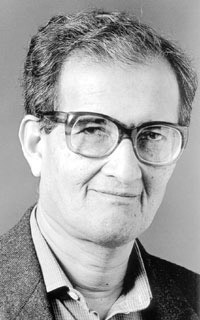She says both of these questions will be addressed, but to clarify the second question, she wants to make sure that these "disadvantaged peoples" aren't further debilitated by technology which might have been created for more advantaged and literate or educated people. The term "ICT" is referred to quite a bit, seeing as it's in the title, and a brief description and example is in order. ICT stands for Information and Communication Technologies, which as they might sound, are used for people to communicate with one another when they're not in each others general vicinity. These can be things like cell phones, Facebook, Twitter, Kik, and in extreme retro cases, beepers or pagers. Any new age technology which can be use to communicate with another person is an ICT.
Amartya Sen, creator of "The Capabilities Approach":

(http://www.nobelprize.org/nobel_prizes/economic-sciences/laureates/1998/sen-bio.html)
No comments:
Post a Comment